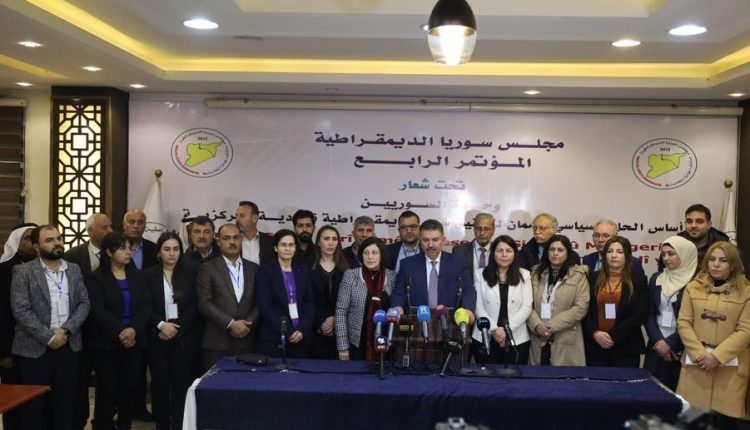SDC Criticizes Syria’s National Dialogue Conference Over Exclusion and Hasty Decisions
By Kardo Roj
QAMISHLI, Syria (North Press) – The Syrian Democratic Council (SDC) has strongly criticized the recently concluded National Dialogue Conference, arguing that it lacked fair representation and failed to address Syria’s critical issues with the seriousness they deserve.
The conference, which ended on Tuesday, resulted in several resolutions, the most notable being the formation of a committee tasked with drafting a permanent constitution for Syria. However, various Syrian political actors, including the Autonomous Administration of North and East Syria (AANES), have raised concerns about both the structure of the event and the legitimacy of its outcomes.
In a statement released Wednesday, the SDC condemned the conference as an extension of what it called “the long-standing policy of exclusion and marginalization” that has shaped Syria’s political landscape for decades. The council argued that the absence of meaningful representation for all Syrian components and the rushed nature of the event demonstrated a lack of commitment to a genuine national dialogue.
“The exclusion of key national forces and political actors will only deepen divisions and obstruct any real opportunity for a successful political transition,” the statement warned.
The SDC further criticized the conference as a “symbolic gesture” rather than a serious step toward resolving Syria’s complex political crisis. The council expressed skepticism over whether the proposed constitutional committee would be able to produce a truly representative and democratic framework for Syria’s future governance.
“Monopolizing political decision-making and sidelining influential Syrian groups will not contribute to building a stable and inclusive Syria,” the statement read.
The National Dialogue Conference was intended to bring together various Syrian political factions to discuss the country’s future, but its organization has sparked controversy. The AANES and other political entities have echoed the SDC’s concerns, arguing that the event was conducted without proper consultation and failed to address key governance challenges in post-war Syria.
The SDC has long advocated for an inclusive political solution that incorporates all ethnic and political groups in Syria, particularly those in the northeast, where the Autonomous Administration governs significant territory. The council has also repeatedly called for decentralized governance structures and broader political participation in shaping Syria’s transition.
The SDC’s rejection of the conference’s legitimacy highlights the ongoing fragmentation within Syria’s political opposition and the difficulty of reaching a national consensus on governance and constitutional reform. If the process remains perceived as exclusionary, it risks alienating key stakeholders and complicating efforts for a comprehensive peace settlement.
As political maneuvering continues, it remains uncertain whether Syria’s various factions can overcome their differences to create a truly representative and sustainable political solution.

